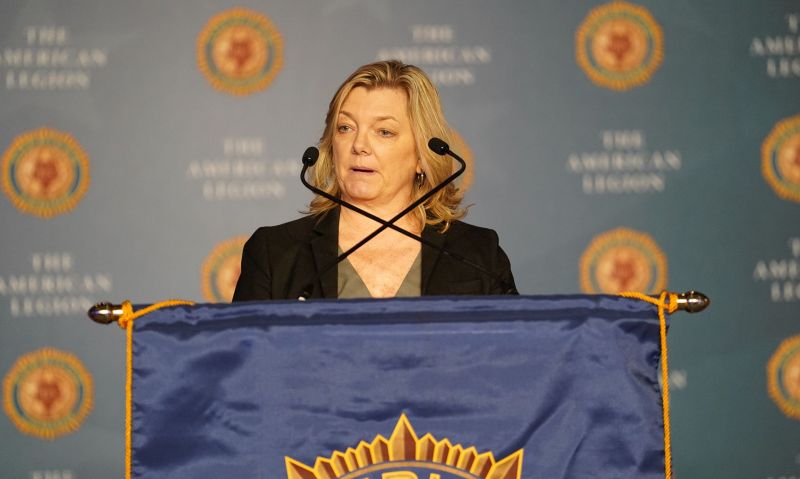
Terri Tanielian also takes time to thank The American Legion for its focus on slowing veteran suicides, noting her own Navy veteran father took his own life.
Terri Tanielian is the daughter of a Vietnam War Navy veteran who then served in law enforcement for 20 years. She credits him with instilling in her a sense of service.
He’s also the reason Tanielian, the Special Assistant to the President for Veterans Affairs, thanked The American Legion for it’s “Be the One” veteran suicide-prevention initiative during her address Feb. 28 at the Washington Conference.
“I am so grateful that suicide prevention is a high priority to The American Legion,” Tanielian said. “Not just because of my role in the work I do professionally, but also because its personal. You see, in 1999 my father became one of the veteran suicides statistics. Losing a loved one to suicide leaves not just an empty chair at the table, but many unanswered questions of what more you could have done to fix the systems that missed the signs and let him fall through the cracks.
“More must be done to ensure veterans have the resources and support they need when and where they need them, especially before they experience crisis. So, on behalf of all families who’ve lost a veteran to suicide, and on behalf of the administration that is working like hell to improve prevention and treatment, I say thank you.”
Tanielian is a nationally recognized expert in veteran and mental health policy. She served as a Senior Behavioral Scientist at the RAND Corporation, leading several landmark studies examining the needs of servicemembers, veterans, their families and their caregivers.
She said President Biden believes the nation’s most sacred obligation to members of the U.S. military is “preparing and equipping the troops we send into harm’s way, and then caring for them and their families when they return home. Driving forward with President Biden’s personal commitment to this obligation is the primary focus of my role at the White House.”
Tanielian said the president recognized early on the pressing issue of veteran suicides. “When the president named this a priority, I knew I was in the right place at the right time,” she said. “This is an issue I had been working my entire career to address. We know that far too many of our nation’s veterans and servicemembers have died by suicide.
“You all know the statistics. And over the past decade, more veterans have died by suicide than have died from combat in the Vietnam War and the Global War on Terror combined.”
Tanielian said while there is no single cause for a veteran taking his or her own life, nor a single solution to stopping that, “We know that every suicide is preventable.”
To further that effort, Tanielian said in November 2021 the White House unveiled a comprehensive strategy to reduce veteran suicides built around five key components:
· Improving lethal means safety
· Enhancing crisis care and facilitating care transitions;
· Increasing access to and delivery of effective care;
· Addressing upstream risk and protective factors; and
· Increasing research coordination, data sharing and evaluation efforts.
“The administration recognizes that suicide is a complex problem,” Tanielian said. “One that requires a comprehensive approach, one that leaves no stone unturned, but built on a foundation of science. An approach that harnesses the full breath of the federal government in close collaboration with states, territories, tribes and local governments.
“We also acknowledge that implementation requires close partnerships with nongovernmental organizations, including veterans service organizations, military support organizations and, especially, The American Legion.”
Tanielian noted that President Biden discussed improving suicide prevention programs in his State of the Union address earlier this year. “He announced new steps that we would be taking to expand support, address upstream risk factors like financial and legal issues for our veterans, and provide new federal resources to states and territories to help them implement actions at home as well,” she said.
- Be the One

